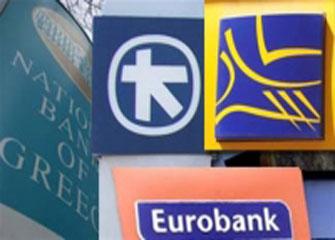By Nektaria Stamouli, Market watch
ATHENS–Greek lenders National Bank of Greece SA and Eurobank Ergasias SA reported Wednesday that their flow of nonperforming loans slowed at the start of the year as Greece's economy began to show signs of a turnaround.
NBG, the country's largest lender by assets, said loan provisions for the first three months of the year stood at EUR362 million ($424 million), down 7% on quarter and 15% on year. This was due to the continuing reduction of bad loans, which decreased further by 32% to EUR312 million.
Provisions for the country's third-largest lender by assets, Eurobank reached EUR479 million, slightly up from EUR417 million on year, but down 26% on the quarter.
"The continuing increase in pre-provision income, the decline of [bad loans] and the discontinued usage of [the European Central Bank's emergency liquidity assistance] allow us to be optimistic for the implementation of our strategic plan and further improvement in the next quarters," Eurobank's Chief Executive Christos Megalou said in a statement. He added that the effective management of nonperforming loans remains the lender's priority.
But the two banks, along with rivals Alpha Bank AS and Piraeus Bank SA who report their earnings later this week, are still struggling to cope with a mountain of nonperforming loans that have built up since Greece first plunged into recession six years ago.
Last year, the country's banks were recapitalized with the help of a European Union loan, but together they still hold some EUR70 billion in bad loans–a sum equal to a third of Greece's annual gross domestic product.
NBG posted a first-quarter net profit of EUR181 million up from EUR27 million in the year-ago period. The bank reported net interest income of EUR751 million, slightly lower than the EUR772 million euros a year before.
Earlier this month, the country's flagship lender had successfully raised EUR2.5 billion from private investors.
Eurobank posted another net loss for the first quarter of EUR207 million, an improvement from a EUR375 million net loss in the same period last year. The bank reported a net interest income of EUR367 million, up from EUR270 million the year before–reflecting improved funding costs for the lender.
In April the bank raised nearly EUR3 billion in fresh capital, becoming the first major Greek bank to return to private investors, after having received state support.
Piraeus and Alpha also raised capital totaling nearly EUR3 billion in March.
Increased investor interest in Greek banks comes amid improving prospects in the sector despite the country's ongoing economic problems.
Earlier May, rating agency Moody's upgraded its outlook on Greece's banking sector to stable from negative, amid expectations that the country's economy would return to growth this year and next.
For this year, Greece and its international creditors expect the economy to expand by 0.6%, marking its first growth since 2007.



















